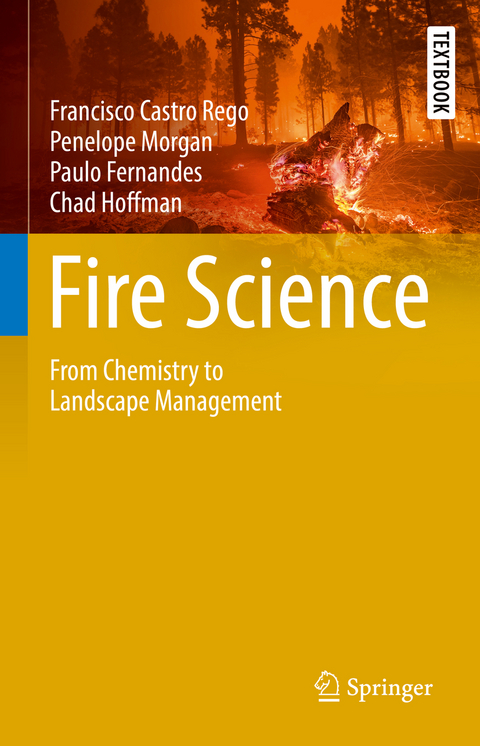
Fire Science
Springer International Publishing (Verlag)
978-3-030-69814-0 (ISBN)
This textbook provides students and academics with a conceptual understanding of fire behavior and fire effects on people and ecosystems to support effective integrated fire management. Through case studies, interactive spreadsheets programmed with equations and graphics, and clear explanations, the book provides undergraduate, graduate, and professional readers with a straightforward learning path. The authors draw from years of experience in successfully teaching fundamental concepts and applications, synthesizing cutting-edge science, and applying lessons learned from fire practitioners.
We discuss fire as part of environmental and human health. Our process-based, comprehensive, and quantitative approach encompasses combustion and heat transfer, and fire effects on people, plants, soils, and animals in forest, grassland, and woodland ecosystems from around the Earth. Case studies and examples link fundamental concepts to local, landscape, and global fire implications, including social-ecological systems. Globally, fire science and integrated fire management have made major strides in the last few decades. Society faces numerous fire-related challenges, including the increasing occurrence of large fires that threaten people and property, smoke that poses a health hazard, and lengthening fire seasons worldwide. Fires are useful to suppress fires, conserve wildlife and habitat, enhance livestock grazing, manage fuels, and in ecological restoration. Understanding fire science is critical to forecasting the implication of global change for fires and their effects. Increasing the positive effects of fire (fuels reduction, enhanced habitat for many plants and animals, ecosystem services increased) while reducing the negative impacts of fires (loss of human lives, smoke and carbon emissions that threaten health, etc.) is part of making fires good servants rather than bad masters.
Dr. Francisco Manuel Cardoso Castro Rego is Professor and Director of Centro de Ecologia Aplicada "Prof. Baeta Neves", Instituto Superior de Agronomia in Lisbon, Portugal. He was lead of the Fire Paradox project funded by the European Union, with 36 partners from 16 countries, that advanced fire science and fire policy. Dr. Rego's research covers the ecological effects, behavior and management of wildfires. He currently serves on the commission to investigate and recommend policy changes to address recent large fires in Portugal.
Dr. Chad Hoffman is an Associate Professor in the Department of Forestry & Rangeland Stewardship at Colorado State University. He is an expert in fire behavior, and his research interests focus on modeling fuels and fire behavior, including fuel treatment effectiveness. He received his Bachelors and Masters degrees in Forestry from Northern Arizona University in 2003 and 2005 respectively, and his PhD in Natural Resources from the University of Idaho in 2011.
Dr. Paulo Fernandes is a Professor in ecology, forestry and environmental science at Universidade de Tras-os-Montes e Alto Douro, in Vila Real, Portugal. He is an internationally recognized expert in fuels and fire science, and his research interests include both basic fire science and applications for fire ecology and fire management.
Dr. Penelope Morgan is a Professor in the Department of Forest, Rangeland and Fire Sciences at the University of Idaho. Her research interests include fire ecology, fire management, landscape ecology and landscape dynamics. She received her Bachelors and Masters degrees at Utah State University in 1977 and 1979 respectively, and her PhD at the University of Idaho in 1984.
Part I: Introduction.- Part II: Combustion and Heat transfer processes.- Chapter 1: Ignition: Chemical Conditions.- Chapter 2: Chemical Processes: From Fuel to Smoke.- Chapter 3: Heat Production.-Chapter 4: Heat for pre-ignition and flames.-Chapter 5: Heat transfer.-Part III: Vegetation fuels, fire behavior and effects.-Chapter 6: Fuels and fire behavior description.-Chapter 7: Fire Propagation.-Chapter 8: Extreme Fire Behavior.- Chapter 9: Fire Effects on Plants, Soils and Animals.-Chapter 10: Fire and people.- Part IV: Managing fuels, fires and landscapes.- Chapter 11: Fuel dynamics and management.-Chapter 12: Fire regimes, landscape dynamics and landscape management.-Chapter 13: Integrated Fire Management.- Chapter 14: Futuring: Trends in Fire Science and Management.
| Erscheinungsdatum | 26.09.2021 |
|---|---|
| Reihe/Serie | Springer Textbooks in Earth Sciences, Geography and Environment |
| Zusatzinfo | XXXVIII, 644 p. 326 illus., 243 illus. in color. |
| Verlagsort | Cham |
| Sprache | englisch |
| Maße | 155 x 235 mm |
| Gewicht | 1184 g |
| Themenwelt | Naturwissenschaften ► Biologie ► Ökologie / Naturschutz |
| Naturwissenschaften ► Geowissenschaften ► Geologie | |
| Schlagworte | Behave Plus • Chemistry of fuels • Combustion behavior • Crown fires • Fire-atmospheric interactions • Fire behavior • Fire behavior textbook • Fire recovery • fire suppression • Fuelbeds • Heat transfer modes and rates • Oxygen limitations • Resilience of ecological systems • Surface fire models • Wildfire • Wildland Fires |
| ISBN-10 | 3-030-69814-9 / 3030698149 |
| ISBN-13 | 978-3-030-69814-0 / 9783030698140 |
| Zustand | Neuware |
| Haben Sie eine Frage zum Produkt? |
aus dem Bereich


